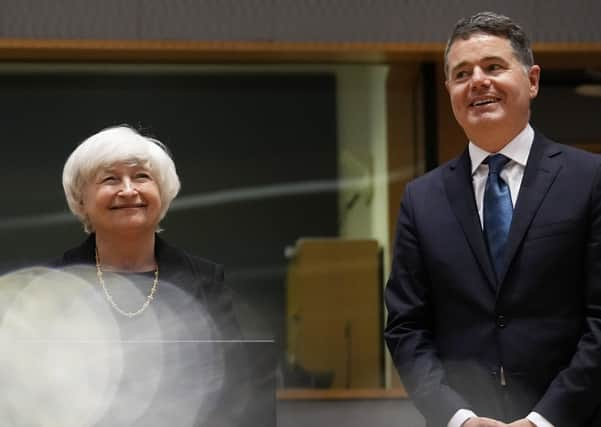Ireland increasingly isolated amid global bid to lift corporation tax


The Republic’s Finance Minister Paschal Donohoe met the United States Treasury Secretary Janet Yellen yesterday in Brussels as international pressure mounts on Dublin’s opposition to global corporate tax reform proposals.
Ireland has become an outlier internationally in resisting proposals for a minimum global rate of 15% on corporations.
Advertisement
Hide AdAdvertisement
Hide AdThe move is backed by 130 countries worldwide, including the G20 and the EU, but Ireland is seeking to maintain its 12.5% rate.
For many years, there was debate in Northern Ireland about setting a corporation tax rate lower than the rest of the UK, and more in line with the Republic.
On Monday Tanaiste Mr Varakdar defended Ireland’s stance against a minimum rate, saying the proposals were not just about “tax justice” but about “big countries trying to get a bigger share of the pie”.
He said: “First of all, this stable low corporation tax regime of 12.5% has worked for Ireland. We’ve taken about 10 billion euros a year in corporation profit tax, double what the average European country does per head.
Advertisement
Hide AdAdvertisement
Hide Ad“It’s one of those examples of where low taxes result in higher revenues, in a world where wealth capital, labour, corporations are very mobile.”
He added: “We shouldn’t be under any illusions about what is going on here.
“This isn’t just about tax justice and big companies paying their fair share of tax, although it is about that. This is about big countries trying to get a bigger share of the pie.
“Large countries are trying to gain tax revenues at the expense of smaller countries like Ireland, for example, Luxembourg, the Netherlands and others.”
Advertisement
Hide AdAdvertisement
Hide AdHe said larger countries were looking out for their own interests and Ireland should do the same.
“Britain has secured a carve-out for financial services, in order to protect the city of London,” Mr Varadkar said.
“America has secured commitments that the European Union will not go ahead with tax on digital companies. So, we have to look after our interests too, and we will.”
Mr Varadkar said Ireland would prefer to be inside the tax agreement than outside it, and that negotiations on the subject will continue.
Advertisement
Hide AdAdvertisement
Hide AdHe added: “We’re not going to sign up to or endorse an agreement that doesn’t protect our fundamental interests in a small country.”
The Tanaiste was speaking at the launch of the IDA (Industrial Development Authority) Ireland annual report for 2020.
The IDA has reported investment in the first half of 2021 returning employment creation to pre-pandemic levels, with an associated employment potential of more than 12,530 jobs.
IDA chief executive Martin Shanahan said the stability of Ireland’s corporate tax rate has boosted investor confidence in the country.
Advertisement
Hide AdAdvertisement
Hide AdHe said: “I think from a client’s perspective they continue to have significant confidence in Ireland. That is down to the stability of the taxation regime and rate over many years. That’s why we continue to see the numbers in 2020 that we saw, and the numbers now in the first half of 2021. Investors have confidence in Ireland.
“We know it is more likely that there will be a global tax framework agreed, rather than less likely at this point.”
Ireland has said that it can sign up to many aspects of that global agreement and Mr Shanahan said Ireland had opposed moves to minimum global tax rate for “legitimate” reasons.
He said: “There is a lot of technical detail to be worked through, even on what is currently being agreed in principle. It is perfectly legitimate that Ireland would articulate Ireland’s case within a global negotiation.
Advertisement
Hide AdAdvertisement
Hide Ad“I think there’s nothing remarkable about that and nor do our clients find that remarkable.”
He added: “There are still political discussions and policy discussions to be had between now and October.”
Mr Shanahan said “remaining stable and competitive is where we need to be”.
——— ———
A message from the Editor:
Thank you for reading this story on our website. While I have your attention, I also have an important request to make of you.
Advertisement
Hide AdAdvertisement
Hide AdWith the coronavirus lockdown having a major impact on many of our advertisers — and consequently the revenue we receive — we are more reliant than ever on you taking out a digital subscription.
Subscribe to newsletter.co.uk and enjoy unlimited access to the best Northern Ireland and UK news and information online and on our app. With a digital subscription, you can read more than 5 articles, see fewer ads, enjoy faster load times, and get access to exclusive newsletters and content. Visit https://www.newsletter.co.uk/subscriptions now to sign up.
Our journalism costs money and we rely on advertising, print and digital revenues to help to support them. By supporting us, we are able to support you in providing trusted, fact-checked content for this website.
Ben Lowry
Acting Editor